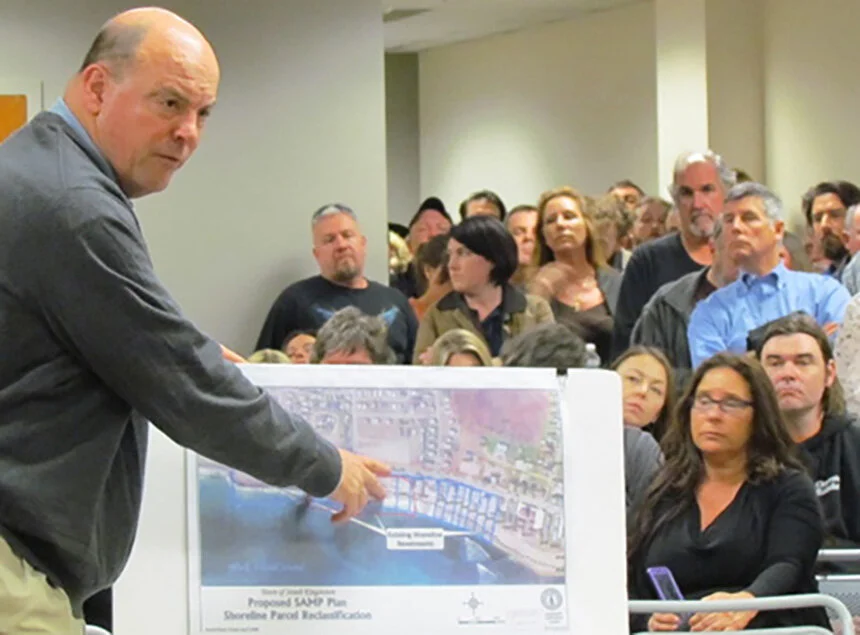By TIM FAULKNER/ecoRI News staff
 |
| Grover Fugate was hired 34 years ago as the Coastal Resources Management Council’s first executive director. (ecoRI News) |
Fugate
is set to retire by June 1 and will be joined some time this year
by coastal policy analyst James Boyd. Aquaculture coordinator David Beutel
is also expected to retire this year. Geologist Janet Freedman and two others
are also eligible for retirement.
Two other staff members are eligible to retire next year.
Two other staff members are eligible to retire next year.
With
only 30 employees, CRMC is one of the smallest state agencies,
serving as a zoning department and oversight board for coastal and offshore
development, including offshore wind.
Fugate
has served as executive director since 1986, guiding the agency during some of
its most tumultuous times. The CRMC council has been a source of controversy for decades,
with unfilled seats, dubious political appointees, and favoritism toward
developers.
The
agency was created in 1971 after the near-approval of large fossil-fuel
projects, such as oil refineries within Narragansett Bay.
In 1974, CRMC made one of its most criticized decisions, when it approved the filling of 45 acres of upper Narragansett Bay to build a port terminal for the Providence & Worcester Railroad.
In 1974, CRMC made one of its most criticized decisions, when it approved the filling of 45 acres of upper Narragansett Bay to build a port terminal for the Providence & Worcester Railroad.
It
wasn't until 1986 that CRMC received staff funding, and Fugate was hired as its
first and, so far, only executive director.
More
recently, the CRMC council endured the scorn of the environmental community for
its approval of a natural-gas
liquefaction plant at the Port of Providence.
Fugate
doesn’t vote on project applications, and at times the 10-member council makes
decisions against the recommendations of CRMC staff, such as the approval of a seawall on Matunuck
Beach Road in South Kingstown.
Unlike
other state agency directors who are appointed by the governor and confirmed by
the Senate, the CRMC executive director is selected by the council.
Complicating matters now is the fact that most of the seats on the CRMC council expire this year and new members or reappointments require approval by the Senate. Appointments are made by the governor. Members can serve for unlimited terms and outgoing members don’t have to leave until a replacement is confirmed.
Complicating matters now is the fact that most of the seats on the CRMC council expire this year and new members or reappointments require approval by the Senate. Appointments are made by the governor. Members can serve for unlimited terms and outgoing members don’t have to leave until a replacement is confirmed.
Fugate
has received national and international awards
for coastal programs and policy, such as the Peter Benchley Ocean Award, and
acclaim for CRMC’s Ocean Special Area Management Plan (Ocean SAMP). The guide
advances nearshore maritime activities and opened the way for the Block Island
Wind Farm and the wave of offshore wind development since.
Similar SAMPs for beaches and Narragansett Bay
serve as guides for shoreline issues such as aquaculture, sea-level rise, and
other impacts of the climate crisis.
Fugate
is leaving as the offshore wind industry is ramping up for massive development
in federal wind areas off Massachusetts and Rhode Island. Many issues require
guidance and approval from CRMC, such as the installation of transmission lines
that run through state waters and the layout of thousands of turbines.
Fugate
acknowledged that finding replacements might be difficult considering that the
private sector offers higher wages and better benefits than CRMC.
He
told ecoRI News that the other retirees are leaving because they have also
served long tenures at CRMC and qualify for retirement.
“There
really is no good time (to retire"),” Fugate said.
The
North Kingstown resident has no immediate plans after leaving, other than to
take a break from his hectic schedule for a few months and spend time with
his family.
“It’s
a decision that I wrestled with for a long time,” Fugate said. “Sometimes
you know you need to walk out the door.”
CRMC
spokesperson Laura Dwyer said the agency has been preparing for the loss of the
eight employees and their decades of experience and institutional knowledge.
The retirements aren’t happening all at once and CRMC is preparing for the departures by holding staff talks and training to share and retain the institutional knowledge. Meanwhile, discussion of Fugate’s replacement is ongoing and may lead to a nationwide candidate search.
The retirements aren’t happening all at once and CRMC is preparing for the departures by holding staff talks and training to share and retain the institutional knowledge. Meanwhile, discussion of Fugate’s replacement is ongoing and may lead to a nationwide candidate search.
“It’s
business as usual,” Dwyer said. “We will still go forward. We are planning for
these retirements.”